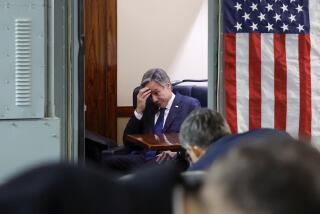THE GULF WAR: The Diplomatic Front : In Washington
- Share via
PRESIDENT BUSH denounced the “brutal parading” of captured allied airmen on Iraqi television . . . For the second straight day, Iraq’s top-ranking diplomat in Washington was summoned to the State Department to receive a formal letter of protest. But he, in turn, charged that allies are bombing “old women, men and children.”. . . In CONGRESS, House Speaker Thomas S. Foley (D-Wash.) said exploitation of the POWs “will have very strong repercussions, not only throughout the United States but throughout the world if these violations continue.”
In Europe
In GENEVA, the International Red Cross said Iraq’s treatment of allied POWs violated the Geneva Convention of 1949, which requires POWs to be protected from “acts of violence or intimidation and against insults and public curiosity.” . . . In LONDON, British Prime Minister John Major told the House of Commons: “Such action (involving POWs) would be inhuman, illegal and totally contrary to the Third Geneva Convention.” . . . The FRENCH Foreign Ministry proclaimed “indignation” over the action and called in the Iraqi ambassador to lodge an official protest.
In the Mideast
In IRAQ, Radio Baghdad said President Saddam Hussein has rejected a peace proposal from Soviet President Mikhail S. Gorbachev . . .EGYPT held diplomatic consultations with Arab friends and sent envoys to Libya and Syria amid reports that President Hosni Mubarak was considering seeking a cease-fire in the Gulf War. But Iraqi and Kuwaiti sources denied a cease-fire is being sought . . . In IRAN, Foreign Minister Ali Akbar Velayati said the non-aligned movement will launch a peace initiative. He said the move was backed by INDIA, YUGOSLAVIA and ALGERIA.
More to Read
Sign up for Essential California
The most important California stories and recommendations in your inbox every morning.
You may occasionally receive promotional content from the Los Angeles Times.













